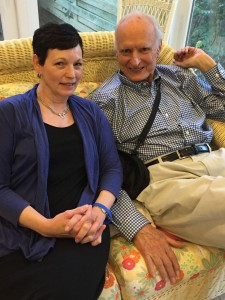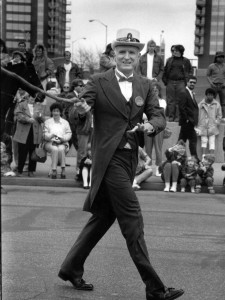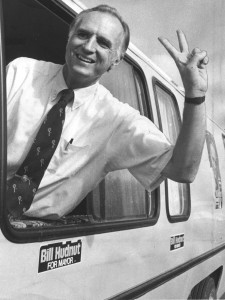 By Matt Tully
By Matt Tully
The Indianapolis Star
June 21, 2015
CHEVY CHASE, Md. – Bill Hudnut shouted from the basement of his home near Washington, D.C.
I’ll be there in a minute,” he said. “It just takes me a while.”
At 82, the former mayor of Indianapolis, the city’s longest-serving and probably most charismatic mayor, faces a long list of severe health problems. The worst is an advanced and terminal form of congestive heart failure, which is mitigated only by medicine that will eventually stop working. The diagnosis is grim. He knows that.
But any thought that my visit would be a woeful affair disappeared the moment Hudnut took his last, slow step from his basement and into the kitchen of his home on a quiet street in this bustling D.C. suburb. The Hudnut smile — that big welcoming grin many of you have seen so many times — was there.
The Hudnut spirit was there, too.
You know what spirit I’m talking about, right? It was defined by the most memorable moments of the 16 years Hudnut spent as mayor: Like the time he put on a red, white and blue stocking hat and jumped on a snowplow during a blizzard that had paralyzed the city. Or when he dressed up as a leprechaun — all 6 foot 5 inches of him — and marched in the annual St. Patrick’s Day Parade. Or when he pushed the fiscally conservative city he led to dream big and build a football stadium before it even had a team.
“It’s about optimism,” the minister-turned-politician said as we sat down for tea June 12. .
It’s also about thinking about the future, he added, and having a little fun. That’s the Hudnut spirit. The one that guides a house with an official “no moping and no whining” rule. The one that got him through the highs and lows of four terms as mayor, and that’s getting him through a health decline dotted by scary close calls, repeated hospitalizations, one brutal diagnosis after another, conversations about hospice care, and questions about what the coming months will bring.
 Despite all of that, an afternoon and evening spent with Hudnut, who left office in 1991, was at its core about optimism. Despite the excuses he could give for putting that trademark optimism away, he isn’t doing so.
Despite all of that, an afternoon and evening spent with Hudnut, who left office in 1991, was at its core about optimism. Despite the excuses he could give for putting that trademark optimism away, he isn’t doing so.
“Life is about more than making do and just getting by,” the former mayor told me as he sat on a loveseat next to his wife of 26 years, Beverly. “You enjoy life. No matter what. You have to be grateful for each day. You have to. And be cheerful. Why not? Right? And don’t forget to have a sense of humor. That’s very important and it makes every day a little easier.”
Not that these days are easy. Life for Hudnut is filled with medical appointments and tubes inserted into his body that deliver heart medicine and other treatments. He gets dizzy and can’t walk without a cane or walker. He can’t drive and, he said, “A lot of my independent lifestyle has disappeared.”
But I want you to picture how he said all those things. He said them while smiling frequently. With shrugs of the shoulders that made clear he wasn’t dwelling on his problems. With loving glances in Beverly’s direction that said he understood the tremendous weight this ordeal has put on the person he calls “my super caregiver.”
He didn’t dwell on his problems. Instead, he wanted to talk about politics and the politicians who are moving his old city forward, about sports and food and family. He’s on leave from Georgetown University but would like to work a bit more, to stay engaged. He hopes to be around long enough to see his youngest son, one he had late in life, graduate from college next spring.
“Life should not be about living in the past but pointing toward the future,” he said, “and that’s what I’m trying to do.”
Hudnut has been in declining health for some time, but things went rapidly downhill at the end of 2014, just after he last visited Indianapolis to take part in the unveiling of a bronze statue of himself, a statue titled Mayor Bill. Once back in Maryland, he underwent 25 radiation treatments for throat cancer.
The radiation appears to have helped, he said, but the heart disease is life-threatening and irreversible, and a malignant patch was recently found on his skin.
“We’re playing whack-a-mole with health issues,” said Beverly Hudnut, 56, a lawyer who works for a nonprofit in D.C. “It’s been overwhelming at times. It’s like this grand unknown. We go out to dinner and have a great time with friends, but the reality is we don’t know when it’s going to stop and that adds a lot of stress.”
 So the couple is trying to fill as many days as possible with visits with friends and time spent together. They no longer buy nonrefundable plane tickets, because of the uncertain future, but they are planning trips to Maine this fall to see their son Chris’ basketball games at Colby College. They insist on remaining positive. On a whiteboard in the kitchen they’ve written: “Keep calm and carry on.”
So the couple is trying to fill as many days as possible with visits with friends and time spent together. They no longer buy nonrefundable plane tickets, because of the uncertain future, but they are planning trips to Maine this fall to see their son Chris’ basketball games at Colby College. They insist on remaining positive. On a whiteboard in the kitchen they’ve written: “Keep calm and carry on.”
Wearing khakis and a blue and white checkered shirt, Bill Hudnut laughed often, first at his home and then over gazpacho at a nearby French restaurant, and he asked probing questions about Indiana politics. Friends tell him he sounds the same as ever on the phone. His voice is indeed strong and his mind is sharp; he now relies on a cane or walker but looks so good it’s easy to forget he is sick. On good days, like this day, the only hint of imminent trouble is the black bag he carries with him, the one that holds a medical device that pumps life-saving medication through a tube into his heart.
The hardest part about accepting Hudnut’s terminal heart condition is that smile. It’s still big and comes across the mayor’s face frequently. It shows that his “be cheerful” mantra isn’t just talk. Don’t question for a second, he said, whether he is still enjoying life.
The last several years have seen a sustained re-embrace of Hudnut by his former city. Perhaps the Super Bowl that Indy hosted in 2012 was the catalyst for that, as so many people realized at that point that Hudnut’s work to lure the Colts and rebuild Downtown had paid off in a way once unthinkable. Or maybe it’s because in this era of destructive and empty politics many are looking back at political giants of the past — politicians who were courageous in policy and positive in spirit — with newfound appreciation. Or maybe it’s because he has never stopped professing his love for Indy, even long after leaving town.
Earlier this year, Hudnut led an effort by the five surviving mayors of Indianapolis — current and former, all owners of solid legacies — to pen a joint letter defending the city during the controversy over the state’s religious freedom debate. Sen. Richard Lugar, one of the former mayors, said the effort was classic Hudnut — energetic, optimistic and focused on the city he loves.
Hudnut smiled as we talked about the letter, which he said was inspired by a desire to stand up for a city he loves at a tough time. But it also showed that the four-term mayor and one-term congressman still understands politics.
“If you’re in politics you have a nose for that kind of thing, things that might get noticed,” he said. “I didn’t have to go out on a truck in the middle of a blizzard. I didn’t have to wear a leprechaun suit in the St. Patrick’s Day Parade. But when you’re in politics you look for those opportunities to connect with people.”
These days, between medical appointments, Hudnut is trying to connect with as many people as he can. He occasionally posts updates on his page on the CaringBridge website, and he writes thank-you notes to those who have reached out to him. He sends frequent emails to friends, and he’s following the race for mayor from 600 miles away.
I asked him what advice he would give to the politician who will take over as mayor on Jan. 1, grabbing the reins of a city Hudnut helped rebuild, one with great strengths but also daunting challenges.
“First of all,” he said, “mind the store.”
By that, he meant that grand plans and big ideas will falter under the weight of a mayor who doesn’t get the potholes filled and the snow cleared from the streets. Running the city well, he said, gives mayors the capital to be visionary.
He said the next mayor must also find a way to be an even bigger player in education, as nothing will shape the city’s future more than the quality of its schools. Meanwhile, he said, a good mayor needs to accept and learn from criticism and be as inclusive as possible.
 “You’re the mayor of people who didn’t vote for you, too,” he said. “You have to find ways to bring the city together. You have to listen. A lot of politicians are not very good listeners. That’s a mistake. You need to get out there with the people and listen to them.”
“You’re the mayor of people who didn’t vote for you, too,” he said. “You have to find ways to bring the city together. You have to listen. A lot of politicians are not very good listeners. That’s a mistake. You need to get out there with the people and listen to them.”
As mayor, Hudnut brought the NFL to town and sparked the Downtown renaissance that has defined Indianapolis for the past 30 years. But his legacy is actually about something bigger.
With the force of his gregarious personality, he rallied the city and convinced its people to dream bigger than they had before. He said he saw his job as being both the city’s coach and its most animated cheerleader. One supporter wrote on Facebook that, “You showed us what was possible.” Mayor Greg Ballard said Hudnut masterfully found ways to rebuild Downtown “while never forgetting about the neighborhoods.” The national reputation he won, meanwhile, helped the city begin to play in the big leagues.
“I loved that job,” Hudnut said. “I remember every day I’d drive Downtown and say to myself, ‘I wonder what’s going to break open today.’ And something always did. But I enjoyed it. I always enjoyed it.”
Time and again, Hudnut apologized to me for “talking about the past,” even though I was the one guiding the conversation in that direction. That’s how our chats have always gone; I wasn’t in town during the Hudnut years and, so, I remain fascinated by the larger-than-life leader who left a transformational mark on a once-sleepy Midwestern community.
Now, I’m equally fascinated by an octogenarian who has a mountain of health problems, who knows the end is near, yet who remains committed to enjoying life and boosting others and the city that he led.
“The question for me,” Hudnut said, “was whether I was willing to find ways to accept all this and enjoy each day as the gift that it is. I decided I was.”